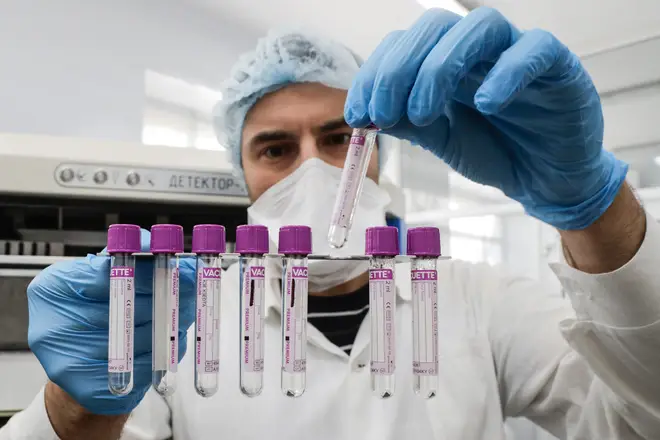
James O'Brien 10am - 1pm
11 November 2020, 14:24

Early data shows Russia's coronavirus vaccine is 92 per cent effective, the country's sovereign wealth fund has said.
The announcement on the Sputnik V vaccine comes days after pharmaceutical giant Pfizer and biotech firm BioNTech released results suggesting their vaccine is 90 per cent effective at preventing Covid-19.
Phase three trials of the Russian vaccine evaluated efficacy among more than 16,000 volunteers who received either the drug or a placebo 21 days after the first injection.
Analysis of 20 confirmed Covid-19 cases, split between vaccinated volunteers and those who received the placebo, indicates the vaccine had an efficacy rate of 92 per cent after the second dose - similar to the Pfizer drug.
Read more: Covid vaccine 'not a get out clause' for second wave Van Tam says
Read more: Pfizer Covid vaccine findings must be understood in more detail, expert says
The Russian Direct Investment Fund (RDIF), which has been backing the vaccine, said there were no "unexpected adverse events" during the trials and monitoring of the participants for side effects or any other issues is continuing.
The results - like the Pfizer vaccine - have not yet been peer-reviewed.
The phase three study of the vaccine, developed by the Gamaleya Institute, is taking place in 29 clinics across Moscow and will involve 40,000 volunteers in total, with a quarter receiving a placebo shot.

What does the Pfizer vaccine announcement mean for me?
Denis Logunov, deputy director of the Gamaleya Centre, which helped develop an Ebola vaccine, said: "Positive interim results of phase three give reasons to expect a successful outcome of Sputnik V clinical trials.
"We will continue to process and analyse all the data and look to the future with optimism, expecting that results of our work will help end the pandemic sooner."
The news comes as reports suggest three doctors in Russia caught coronavirus after being injected with the vaccine.
Read more: NHS told to be ready for Covid-19 vaccine 'from the start of December'
Read more: Compulsory Covid vaccines can be made legal, experts tell MPs
Chief epidemiologist of the Altai Territory, Irina Pereladova, told local news website amic.ru there is no guarantee from a single vaccination that a person will not get sick after it, because they may already have the virus but be in the incubation period.
She added the medics were likely infected in the 24 hours between having negative tests and the first jab.
The website reports all the doctors tested negative for coronavirus a day before the first vaccination, but pre-vaccination tests for coronavirus are not mandatory.
It has raised concerns from other scientists that Russia may be rushing through vaccine development to outcompete other countries.

Covid vaccine will only be distributed when it's 100% safe
Eleanor Riley, professor of immunology and infectious disease at the University of Edinburgh, said: "I worry that these data have been rushed out on the back of the Pfizer/BioNtech announcement earlier in the week.
"The Sputnik data are based on only 20 cases of Covid-19 in the trial participants, compared to more than 90 cases in the earlier trial.
"This is not a competition.
"We need all trials to be a carried out to the highest possible standards and it is particularly important that the pre-set criteria for unblinding the trial data are adhered to avoid cherry-picking the data.
"Anything less than this risks a public loss of trust in all vaccines, which would be a disaster."
Read more: EU to buy 300 million doses of Pfizer Covid-19 vaccine
Read more: Covid-19 deaths above 1,000 per week for first time since June
Professor of virology at the University of Reading, Ian Jones, warned that while the Sputnik vaccine development is "more good news" in the fight against Covid-19, its results were "based on fewer cases than the recent Pfizer data".
"The vaccine looks as efficient and, like the Pfizer data, confirms and extends the earlier phase two results.
"We still need to know about the longevity of the response and the efficiency in different age groups, but the result bodes well for the other trials currently in progress and for having enough vaccine in geographically diverse regions to enable a comprehensive vaccination programme on a global scale."